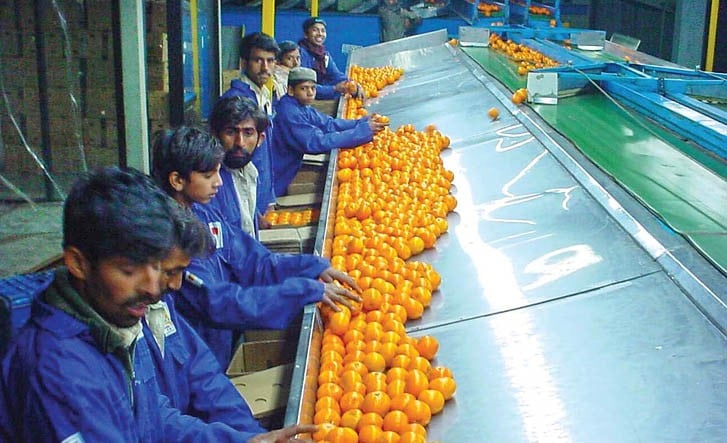
Say hello to food technology, say hello to a bright and healthy future

Latest actions against adulteration and unhealthy food by the Punjab Food Authority have not only jolted the food industry, but have also given rise to a new wave of awareness about health and nutrition among the masses. Universities offering food technology programmes have recently observed increasing number of students.
Food technology studies the production, processing, preservation, packaging, and distribution of food. It involves chemistry, biology, physics, and statistics, for developing techniques to produce, process and preserve healthy and nutritious food. "It includes all; the food safety laws, the complete processes from raw to finished, and the quality control from farms to consumers," says Dr Umair Arshad Bajwa, director Institute of Home and Food Sciences, Government College University Faisalabad.
Opportunities for food technologists are endless; from small industries to multinational firms they are required everywhere. Elaborating the scope of food technology in Pakistan, Dr Bajwa mentions the diversity of landscapes and climates, which is responsible for a variety of crops, fruits and vegetables across the country. "Pakistan is the only heaven on earth where thousands of different kinds of edibles are produced at a time. The tragedy is that the land is fertile and the knowledge, awareness and strategies are poor because we lag far behind in food technology."
Momina Tariq, a student of food technology at Government College University Faisalabad, is very hopeful about the future of food technology in Pakistan. Pakistan is one of the largest producers and supplier of raw items, but when it comes to the profitable finished products’ export, we are just having a bite of it. "We as students and future food technologists are really aiming to lower the drastic ratio between the abundance of raw and the scarcity of edibles," says Momina.
Mohammad Qaddafi, a student of food science and technology at Government College University, Faisalabad, also believes that future is the era of food technology. World population is increasing day by day and agricultural land is reducing. A large number of people are facing scarcity of food. "We can improve it by processing more healthy foods for long time storage, controlling the food wastage and by improving post-harvest losses," says Qaddafi.
"Food industry is the second largest industry in Pakistan," says a report (2014) titled Introduction of food industry in Pakistan & the present status of Nestle Pakistan.
It is the largest industry in the world. Maximum employees across the globe show its vast span extending to a number of fields. "With the implementation of rules by the Punjab Food Authority, according to which two food technologists are must for every food related unit, the number of jobs has increased in every department, promising aspiring careers for youth," says Dr Bajwa.
Food technologists are working as researchers in farms, fields and laboratories to develop novel technology units for processing, sterilising, freezing, fermenting, non-thermal food preserving etc. etc. Food technologists work in hotel industry, dairy sector, agriculture department, and food regulatory and certification departments. The need for plant designers, food processing managers and sales executives is always there. They can serve as quality control managers and food inspectors at a number of places like airports, seaports, export promotion bureau, chamber of commerce and industry, consultancy firms etc.etc. They can also serve internationally at UNICEF, WHO, FAO. Those specialising in nutrition can privately work as clinical dietitian and nutritionist. They can serve at health centres, cardiology institutes, and fitness centres. Food technologists can also work as educationists in colleges and universities.
In Pakistan, food technology as a discipline was first established in 1959 at Punjab Agricultural College and Research Institute Lyallpur. The college then became a university and the discipline was given the status of department in 1961. Now universities across Pakistan are offering courses in every branch of food technology. Government College University Faisalabad, University of Sargodha, Gomel University Dera Ghazi Khan, Karachi University Karachi, University of Veterinary and Animal Sciences Lahore, Bahauddin Zakriya University Multan, Sindh Agricultural University, University of Peshawar, University of Azad Jammu and Kashmir Rawalakot and Hazara University are to name a few. These universities are providing excellent academic and research facilities to address national and international issues pertaining to all aspects of food.
Fiza Saeed, a registered dietitian and nutritionist working at multiple health centres, stresses the need of safe, healthy and nutritionist food for a healthy society and healthy economy. "We eat to live and what an irony that this necessity of life is most adulterated and ignored. The more deeply we indulge in nutrition and technology the more healthy foods we are going to come up with," she says.
According to Dr Bajwa, "Though we are moving at a fast pace in food technology, still a lot of work needs to be done. On the top there is need to improve coordination between academia, the government and food industry. They should work collectively to reform food safety and quality control laws. Industry should also create internship opportunities for students so that they can get practical knowledge. Steps should be taken to enhance consumer response also. If we provide masses comprehensive information about the quality and nutritional values of food, it will surely refine the consumer response about latest technologies."
The government should facilitate food technology exhibitions. These can be a worthy experience for students, public and industry as these events showcase latest technologies. They provide trade platforms and generate business opportunities as buyers and sellers come face to face. Economists should coordinate with food technologists. Knowledge-based economic policies can surely raise the living standards and the economy.
So, say hello to food technology, say hello to a bright and healthy future.